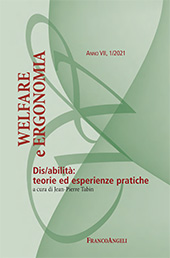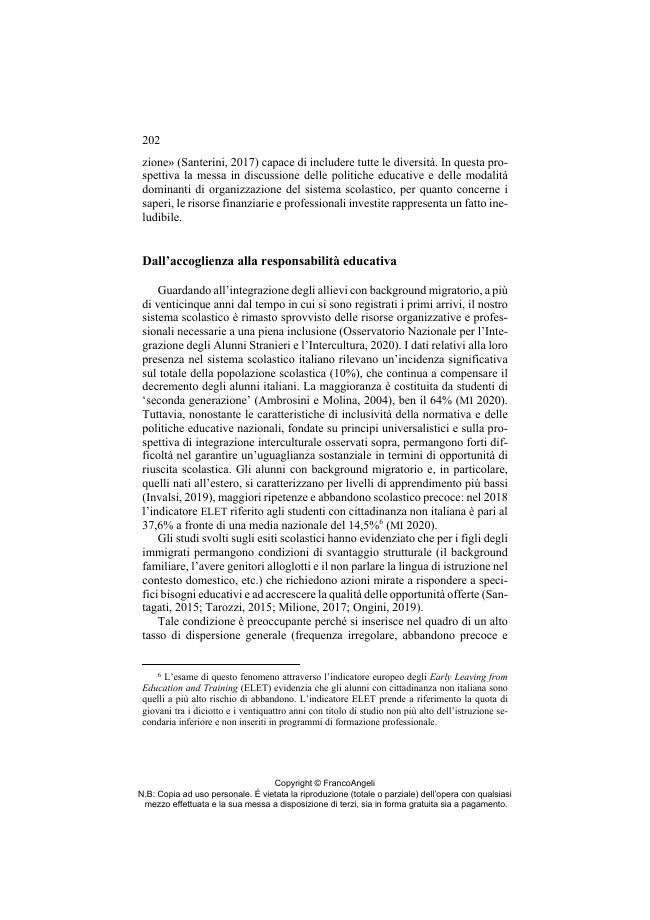L'intercultura in pratica : saperi, competenza e professionalità per la scuola plurale
191-213 p.
Le migrazioni odierne costituiscono un cambiamento strutturale della società contemporanea, manifestano i segni delle trasformazioni degli assetti geopolitici mondiali, le dinamiche della globalizzazione e gli effetti che essa sta producendo sulla società (Sassen, 2014; Geiselberger, 2017; Bauman, 2017; Latour, 2017). Il mondo sta cambiando profondamente e al tempo stesso cambiano gli strumenti di lettura della società: la globalizzazione e lo sviluppo delle nuove tecnologie hanno creato interconnessioni ed interdipendenze che mettono in discussione categorie concettuali autoreferenziali ed etnocentriche. In questa prospettiva, le migrazioni globali e la crescente mobilità verso l'Europa rendono molto rilevante l'analisi dei processi di inclusione sociale in relazione alle risposte che offrono i sistemi educativi. Non si tratta più solo di accogliere migrazioni temporanee, ma di imparare a costruire insieme, e imparare ad abitare uno spazio comune in vista di insediamenti durevoli (Latour, 2017).
Questo cambiamento induce a rivedere radicalmente il canone monoculturale della scuola, a ripensare le strutture organizzative, il progetto pedagogico e le sue matrici curricolari. Il cambiamento epocale di questi ultimi decenni induce ad assumere una nuova vision in cui la scuola è chiamata a confrontarsi con le trasformazioni che attraversano la società globale e con il riemergere della condizione antropologica dell'homo migrans, in movimento da una parte all'altra del globo attraverso infrastrutture fisiche e/o telematiche, che porta a ridefinire i contenuti della cittadinanza sociale in una prospettiva planetaria. Questa visione avvalora e rende ancora più urgente il progetto dell'Educazione interculturale che, ancora impropriamente associata al governo dei flussi migratori e all'inclusione scolastica degli alunni figli di immigrati, rappresenta un'occasione di rinnovamento culturale per la società nel suo insieme.
In questa ottica, l'articolo intende definire i caratteri dell'educazione interculturale e, a partire dall'analisi delle pratiche di inclusione scolastica degli alunni con background migratorio, mettere a fuoco le competenze e le professionalità necessarie a fronteggiare la pluralità dei bisogni educativi che si pongono nelle classi scolastiche italiane al fine di integrare tutte le diversità. [Testo dell'editore].
Today's migrations constitute a structural change of contemporary society, they manifest the signs of the transformations of the world geopolitical order, the dynamics of globalization and the effects that it is producing on society (Sassen, 2014; Geiselberger, 2017; Bauman, 2017; Latour, 2017). The world is changing profoundly and at the same time the tools to read society are changing: globalization and the development of new technologies have created interconnections and interdependencies that question selfreferential and ethnocentric conceptual categories. In this perspective, global migration and increasing mobility to Europe make the analysis of social inclusion processes very relevant in relation to the responses that educational systems offer. It is no longer just a question of accepting temporary migrations, but of learning to build together and to inhabit a common space in view of lasting settlements (Latour, 2017).
This change leads to a radical review of the school's monocultural paradigm, to rethink the organizational structures, the pedagogical project and its curricular matrices. The epochal change of recent decades leads to assume a new vision in which the school is called to deal with the transformations that cross the global society and with the resurgence of the anthropological condition of homo migrans, moving from one side of the globe to the other, through physical and/or telematic infrastructures, which leads to redefine the contents of social citizenship in a planetary perspective.
This vision supports and makes even more urgent the project of Intercultural education which, still improperly associated with the governance of migratory flows and the school inclusion of immigrant pupils, represents an opportunity for cultural renewal for society as a whole. In this context, the article aims to define the characteristics of intercultural education and, starting from the analysis of the school inclusion practices for pupils with a migratory background, to focus on the skills and professionalism which are necessary to address the plurality of educational needs in Italian school in order to promote diversity. [Publisher's text].
Fait partie de
Welfare e ergonomia : VII, 1, 2021-
Articles du même numéro (disponibles individuellement)
-
Informations
Code DOI : 10.3280/WE2021-001016
ISSN: 2531-9817
DISCIPLINES
KEYWORDS
- diversità, integrazione, intercultura, migrazioni, inclusione scolastica
- diversity, integration, interculture, migration, school inclusion



